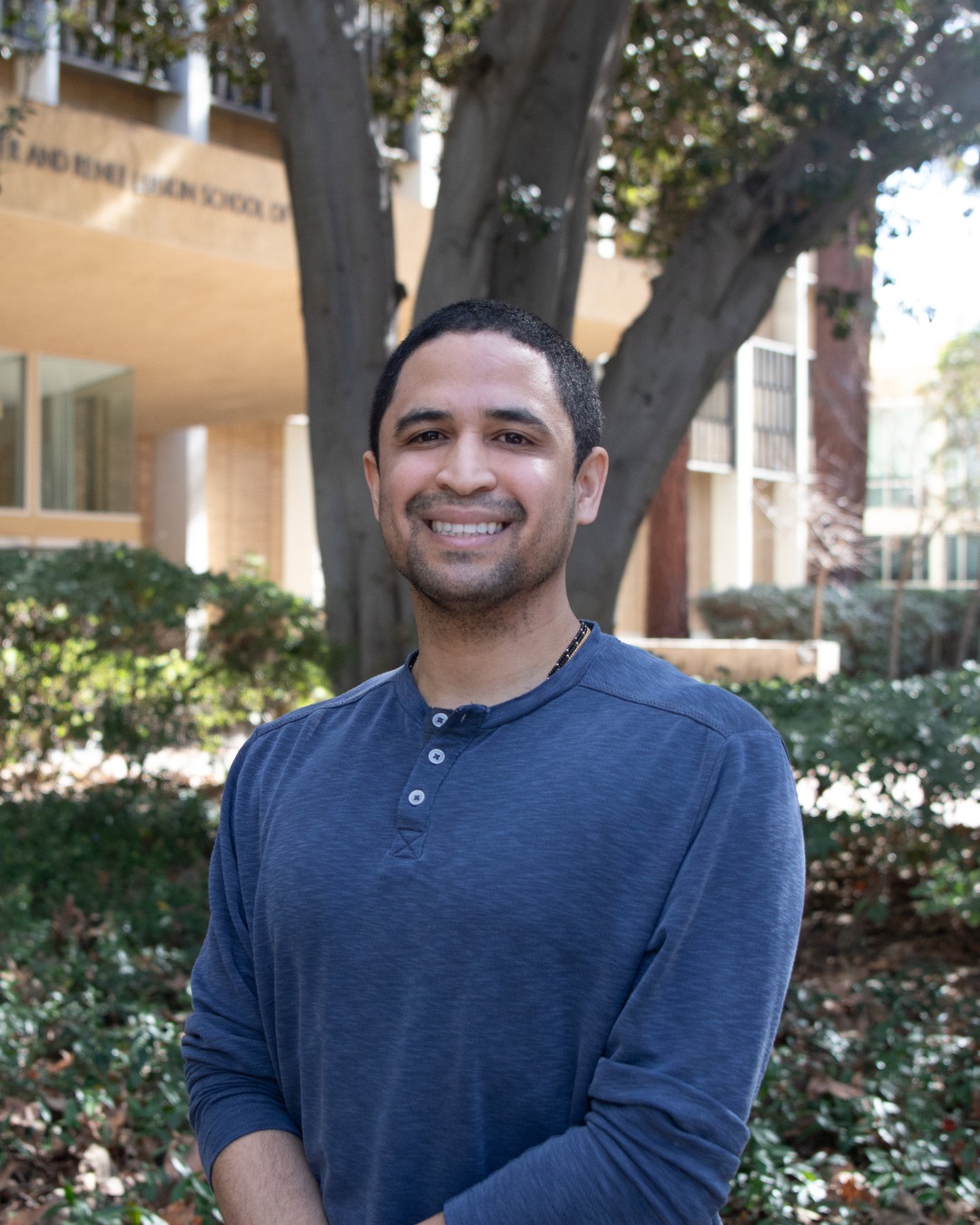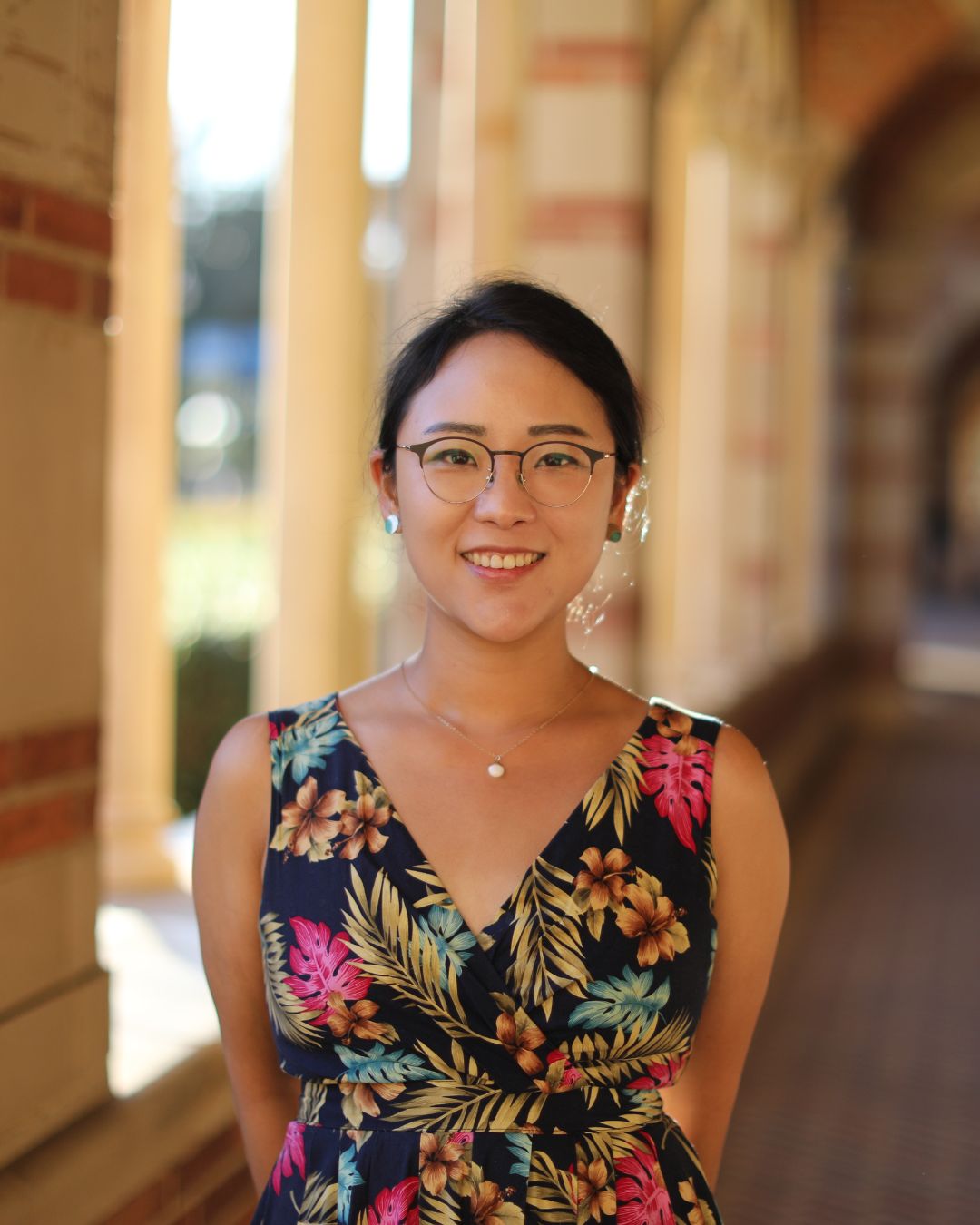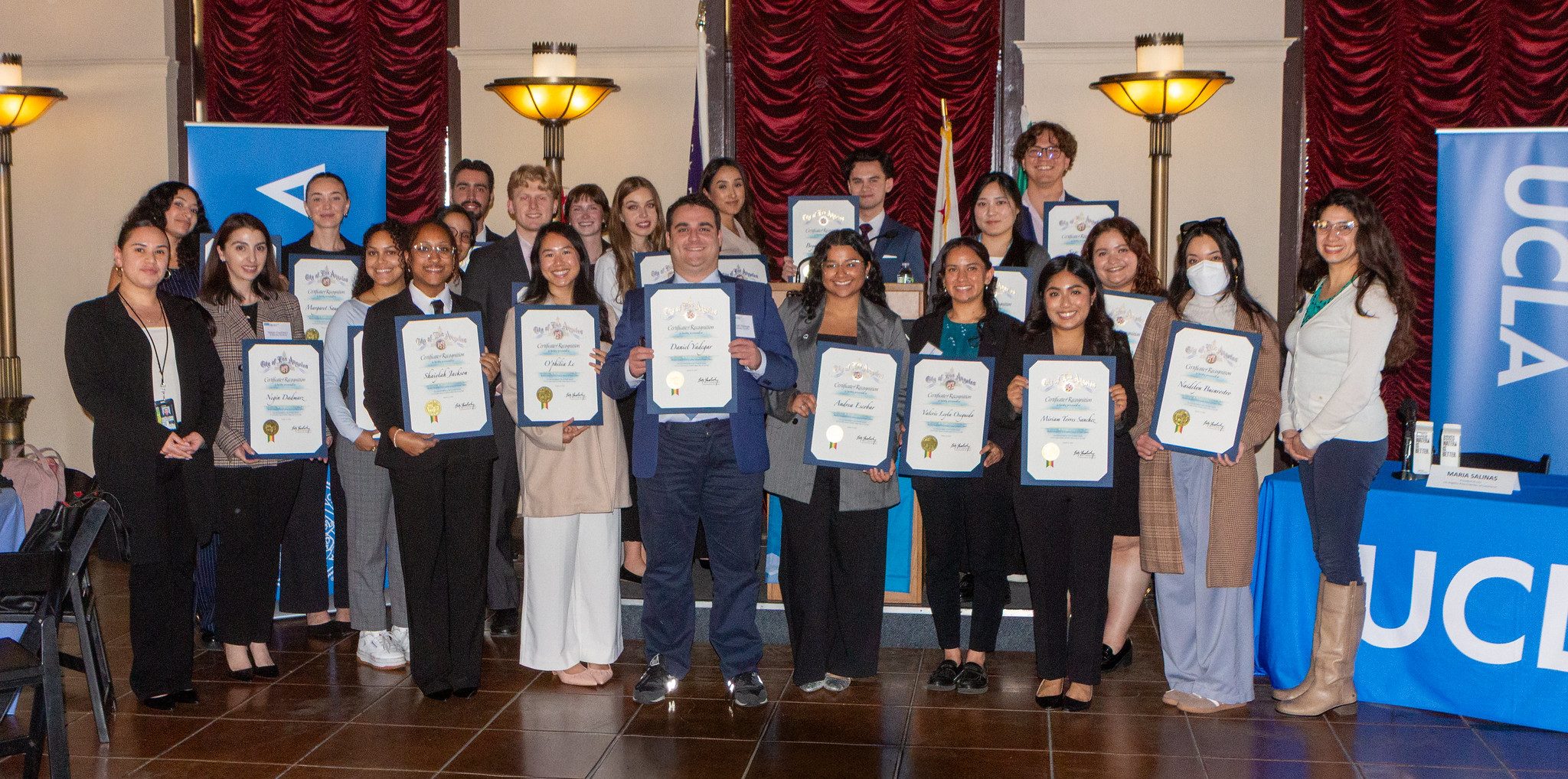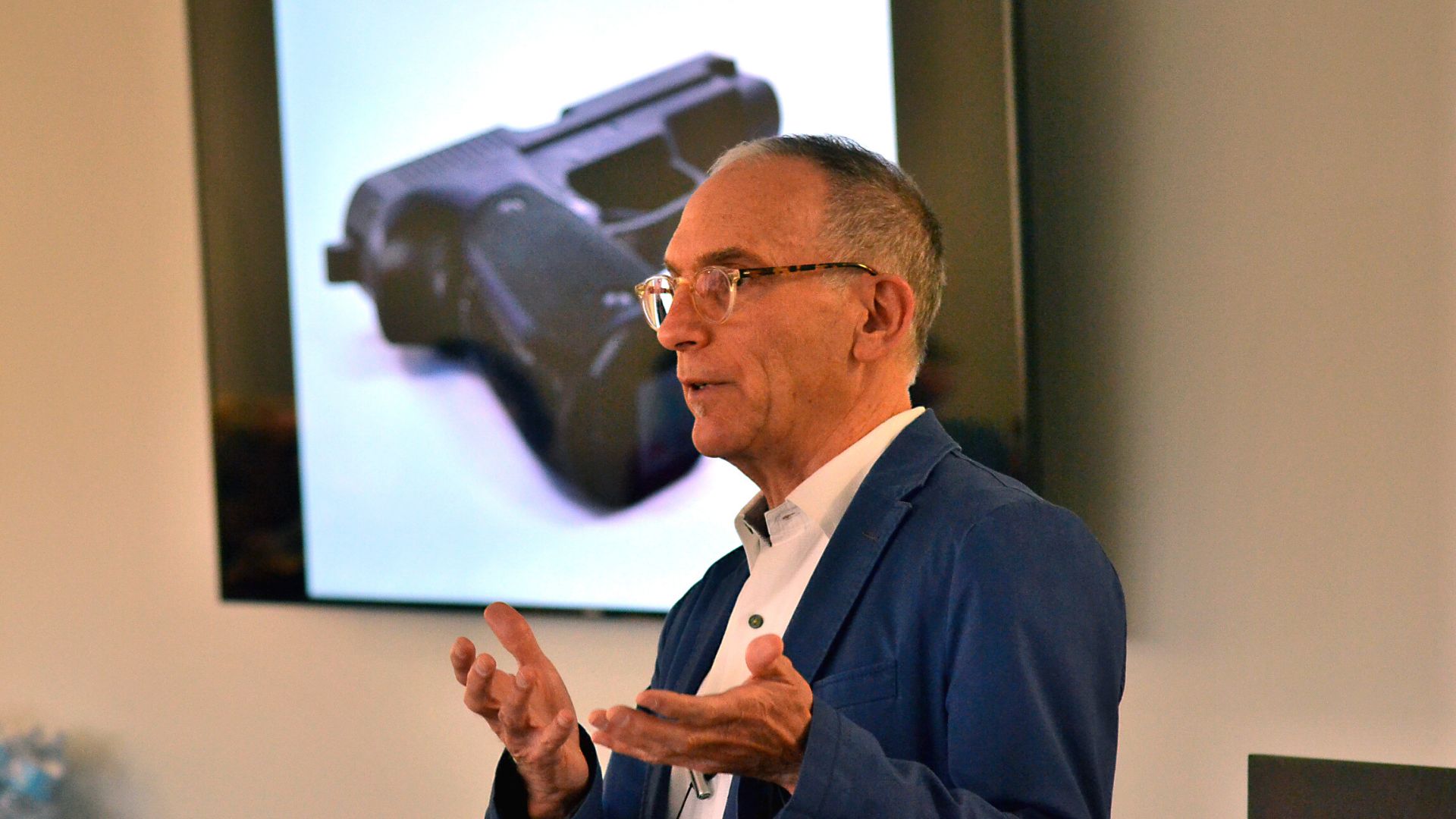Welcoming the 2026 UCLA Activists-in-Residence
The UCLA Activists-in-Residence program welcomed its ninth cohort to campus for a five-month residency that provides time to reflect and recharge, envision new projects, and connect with UCLA faculty, students, and staff.
Four activists are participating in this year’s program, which supports artists, community organizers, and movement leaders as they undertake power-shifting scholarship and pedagogy focused on social change. The UCLA Luskin Institute on Inequality and Democracy will host three activists — José Gama Vargas, Chelsea Kirk, and Chris Tyler — and the UCLA Asian American Studies Center will host Set Hernandez.
- José Gama Vargas, a steward of the vast ancestral territory of the Gabrielino/Tongva Nation, is exploring what it means to unite gardeners as they stand in solidarity with the land, with each other and with the land’s original caretakers.
- Set Hernandez is a queer and undocumented filmmaker, writer, and community organizer with roots in the Philippines. Since 2010, they have organized around migrant justice issues, from deportation defense to health care access.
- Chelsea Kirk is a tenant organizer, researcher, and policy advocate whose work is oriented toward building a better world without predatory landlords. She earned her UCLA Luskin Master of Urban and Regional Planning in 2025.
- Chris Tyler, an organizer with the Los Angeles Tenants Union and communications manager at Strategic Actions for a Just Economy, works for housing and economic justice, organizing neighbors, fighting evictions, and coordinating educational programs.
Learn more about the UCLA Activists-in-Residence program and this year’s cohort
Growth Without Freedom: Bangladesh’s Precarious Path to the 2026 Election New Berggruen Governance Index reveals new insights on state capacity and accountability.
This election brief examines the critical juncture facing Bangladesh as it approaches the February 12, 2026, general election and concurrent referendum on the “July Charter.” Following the 2024 ouster of Sheikh Hasina and the subsequent transition to an interim government led by Muhammad Yunus, Bangladesh seeks to reverse a two-decade trend of democratic backsliding and stagnant state capacity. Utilizing data from the Berggruen Governance Index, this analysis highlights a striking paradox: while democratic accountability and state capacity have significantly withered since 2000, public goods provision has reached record highs, driven by a highly concentrated, export-oriented textile model and growing public debt.
The report evaluates the sustainability of this “authoritarian developmentalism” in a deteriorating international environment characterized by U.S. protectionism and regional instability. It concludes that while the proposed constitutional reforms offer a framework for long-term stability, Bangladesh’s path to reconciling economic growth with democratic liberty remains precarious, requiring a departure from historical East Asian developmental models to suit a more fragmented geopolitical reality.
Seeing Local Policy in Action at Luskin’s Annual City Hall Day Shay Rivera-Bremner, a UCLA Public Affairs undergraduate, reflects on leadership, learning, and local change in Los Angeles.
On Friday, January 23, UCLA Luskin School of Public Affairs hosted its twentieth annual Luskin Day at Los Angeles City Hall, in partnership with UCLA Government & Community Relations and Councilwoman Katy Yaroslavsky. This yearly event gives Luskin students the chance to connect directly with city and county leaders, attend panels on local government reform and immigration policy, and see firsthand how public policy is made. Undergraduate student Shay Rivera-Bremner shares her reflections on her experience attending Luskin’s City Hall Day.

Shay Rivera—Bremner
Sitting on the 26th floor of City Hall overlooking Los Angeles was a powerful experience. I was joined by Luskin students, local leaders, and former leaders whose work has left a lasting mark on the city. Listening to the panelists revealed how meaningful local change is envisioned, coordinated, and carried out across both the city and county. Los Angeles is a pioneer in local policy and others look to our city, our efforts, and our people as models for what is possible.
Leaders from across different sectors, with countless years of combined experience, also recognized that we are living in unprecedented times. Like the students at Luskin, they are still learning and applying their knowledge to navigate uncertainty. This created space for students like myself to recognize that our new ideas and lived experiences can contribute to meaningful change at the local level. Seeing that impact reflected in the city below reinforced the role students can play in shaping Los Angeles.
Los Angeles is a unique, vibrant, and vast city that needs students and lifelong learners to bring together the new and the old as a united front to move forward.
In comparing Los Angeles to other counties and cities, panelists highlighted how uniquely the city has developed over time and how it continues to shape local, state, and national politics. Discussion of the recently passed Measure G—including the expansion of the Board of Supervisors and the creation of a county executive—sparked conversation about how these changes may transform county operations and potentially set a precedent for jurisdictions across the nation.
A panel focused on immigrant rights and affairs in Los Angeles particularly captured my attention. While public attention has shifted elsewhere, City Council Member Eunisses Hernandez emphasized that although the cameras have left Los Angeles, federal agents have not. Our communities continue to feel the effects daily through fear and direct harm. Leaders from Los Angeles County and the City’s Office of Immigrant Rights shared how they have strategized, collaborated, and adapted their approaches to address these ongoing challenges across the city and beyond. With new and unexpected problems comes a need for new solutions to uphold rights and protect public safety for all.
Watching students and local leaders question, discuss, and grapple with the issues directly affecting our communities—and explore new ideas alongside lessons from the past—demonstrated how Luskin fosters dialogue and equips students not only to study theory, but to implement real change.
To view more photos from this day, please see photo album.

Using Data-Driven Solutions to Strengthen Vulnerable Communities Juan J. Nunez, PhD student in Social Welfare, uses research and community engagement to understand inequality
When Juan J. Nunez began studying sociology, he was driven by a fundamental question: how do social constructs drive inequality? Today, as a fourth-year doctoral student in Social Welfare at UCLA, Nunez is answering that question with rigorous data and a community-first mindset.

Juan Nunez
“I began my educational career in sociology because I was always interested in the social structures and systems that shape societies,” Nunez said. “For the first time, I began to truly understand processes and mechanisms that explain complex concepts like inequality.”
That early interest evolved during his master’s studies in sociology at Boston College, where advanced statistics courses introduced him to data analytics and computational methods. The experience clarified his path forward. “I realized I wanted a career that combined social science with data analysis,” he said. “Because I’ve always been focused on the practical impact of my research, pursuing a PhD in Social Welfare felt like the natural next step.”
At Luskin, Nunez studies how child and adult welfare systems respond under stress, particularly during moments of crisis. His work investigates how events like the COVID-19 pandemic and environmental stressors alter reporting patterns and shape the ways institutions respond to adult and child maltreatment.
“By using these large datasets along with cutting-edge methods in the social sciences, my hope is that the research findings guide policies and practices that assist communities in greater need,” he said. “I think the more we know about a social issue, the more we can improve outcomes for people impacted by it.”
In addition to his doctoral research, Nunez plays a key role at the UCLA Pritzker Center, where he helps bridge academic research and community engagement. Through projects examining educational outcomes following disasters like the Eaton Fire and initiatives such as the ENRICH project — which provides financial assistance to young adults aging out of foster care — Nunez works directly with community stakeholders to ensure research reflects lived realities.
“Going out in the community and meeting the stakeholders has been one of the most enlightening experiences of my life,” he said. “Through this research, we are better able to serve our communities because we are informed of contextual mechanisms and processes associated with well-being.”
Central to Nunez’s work is a belief that community-level supports are often undervalued in policy discussions. During the COVID-19 pandemic, he observed how grassroots efforts, from pop-up food pantries to mutual aid networks, played a critical role in reducing household stress and protecting families. “We need to stop viewing these efforts as only during emergencies and start seeing them as essential protective factors that require long-term investment,” he said.
“I couldn’t have made a better choice coming to UCLA for my PhD in Social Welfare — it’s been the best experience of my life”
Reflecting on his time at UCLA, Nunez credits the faculty mentorship that has been instrumental in his growth as a scholar. “One of the most impressive things about Luskin is how amazing all the faculty are,” he said. “Every day I realize how much I learn by being here.”
“I couldn’t have made a better choice coming to UCLA for my PhD in Social Welfare — it’s been the best experience of my life,” Nunez said, reflecting on the mentorship and opportunities that have shaped his growth as a scholar.
Laws to keep guns away from distressed individuals reduce suicides New research co-authored by UCLA Luskin professor Mark S. Kaplan finds ERPO laws save lives.
In 2023, more than half of all suicide deaths in the United States involved firearms. “Red flag” laws—also called Extreme Risk Protection Orders or ERPOs—are designed to reduce these deaths by authorizing temporary firearm removal from individuals deemed at high risk of harming themselves or others. ERPO laws had been implemented in 21 states and the District of Columbia as of February 2025.
But the laws’ effectiveness in preventing suicides was still unclear.
However, a new analysis led by UC Berkeley School of Public Health Research Professor of Health Policy and Management Timothy T. Brown and co-author Mark S. Kaplan, professor emeritus of social welfare at UCLA Luskin School of Public affairs, shows that the passage of ERPO laws does reduce suicides by gun.
Published in JAMA Health Forum, researchers looked at data from four states that passed ERPO laws and eight that did not, and concluded that the laws reduced firearm suicides by a mean of 3.79 incidences per 100,000 population, with an estimated 675 suicides prevented across these four states between the year the law was passed and following year. Non-firearm suicide rates did not change. “We found no evidence of individuals switching to other methods of suicide once firearms were restricted,” said Dr. Brown.
Kaplan noted that despite growing evidence of their effectiveness, ERPO laws continue to face political opposition. “Resistance often comes from gun rights organizations and conservative lawmakers, who argue that such measures threaten Second Amendment rights. It’s time to prioritize community safety by adopting these vital protections,” he says.
Co-author Yunyu Xiao, assistant professor of population health sciences at Weill Cornell Medicine agrees. “Our findings provide rigorous evidence that ERPO laws can prevent firearm suicides without measurable increases in suicides by other means,” she says. “With only 21 states currently having these protections, there is significant opportunity for other states to adopt similar legislation and save lives.”
Additional author include Zhimeng Yan of Weill Cornell Medicine.
One Year After the Fires, What Comes Next? Professor Minjee Kim on Rebuilding Los Angeles for Equity and Resilience
by Peaches Chung
One year after the Palisades and Eaton fires, the physical damage still remains — empty lots, foundations without homes, quiet neighborhoods waiting to return. For Minjee Kim, assistant professor of urban planning at the UCLA, the devastating wildfires presented a rare chance to rethink Los Angeles’ most fire-prone areas, a chance she says, that was largely missed.
“The destruction was so massive,” Kim says. “It presented the city and the county with a chance to think big and to think differently. Unfortunately, that didn’t happen.”

Professor Minjee Kim
Kim’s perspective comes from a long career that spans architecture, planning, and real estate development. Trained as an architect in South Korea, she later shifted to urban planning to have a bigger impact, earning her master’s and doctoral degrees at MIT while she worked in the planning department in the city of Cambridge.
For Kim, the problem extended beyond the speed of recovery to the framework guiding it. In the aftermath of the fires, there were widespread discussions about reimagining fire-prone neighborhoods and designing them to better withstand future climate-related disasters. But as rebuilding moved forward, those conversations failed to materialize into actual, on-the-ground changes.
“We’re essentially rebuilding exactly what was there before,” she says. “We’re not realigning streets, creating meaningful fire breaks, or rethinking evacuation routes in a comprehensive way. We’re not moving away from the most vulnerable areas or increasing density in safer locations.”
For Kim, resiliency is not just about fire-resistant materials, it’s about neighborhood-scale design and coordinated planning.
“Fire resiliency is about systems,” she says. “How infrastructure works together. How people move. How communities are protected as a whole.”
Kim served on the UCLA team of experts advising the Los Angeles County Blue Ribbon Commission, which recommended creating two intergovernmental, quasi-governmental entities: one focused on rebuilding and recovery, and another on fire prevention and management. These agencies were envisioned as vehicles for coordinating across jurisdictions, pooling resources, and acting at a regional scale.
“The destruction was so massive. It presented the city and the county with a chance to think big and to think differently. Unfortunately, that didn’t happen.”
Those recommendations have not been implemented.
“The root of the problem is lack of political will and administrative capacity,” Kim says. “Neither is built to support large-scale reimagination.”
Looking ahead, Kim anticipates construction activity accelerating in years two and three, plateauing by year four, and ultimately resulting in many residents returning.
However, who returns, and how quickly, hinges on who has the coverage and capital to do so.
Kim points out the biggest differential is homeowners’ insurance. In Altadena, many families were underinsured, leaving them without the financial resources to rebuild. In the Palisades, however, demand remains so strong that land parcels are selling for prices comparable to those of homes that once stood on them, giving homeowners far more flexibility in how they recover.
“This is where inequity really shows up,” Kim says. “Two communities experience the same disaster, but their paths to recovery look very different.”Kim is careful to acknowledge the work of public agencies and the state, noting that progress has been made, albeit slowly. Despite her critiques, Kim remains cautiously optimistic. She sees strong demand among residents to return, particularly in Altadena, and believes Los Angeles will recover.
“Los Angeles is a very resilient city,” she says. “It will recover from this horrific disaster.”
The larger question, she argues, is what kind of city emerges.
“One year out, we should be asking not just how fast we’re rebuilding,” Kim says, “but who the system is working for — and who it’s leaving behind.”
As climate-driven disasters become more frequent, Kim believes those questions must move from academic discussion into actual policy change. For Los Angeles, the fires were not just a tragedy — they were a test.
Whether the city learns from it remains an open question.
Q&A with Diana Liu, Masters in Real Estate Development (MRED) Student With nearly two decades of experience in real estate, Diana Liu brings a global, executive-level perspective to UCLA
You came to UCLA Luskin with senior leadership experience at companies like Tesla and Walmart. What made this the right moment to step back into the classroom, and why UCLA’s MRED specifically?
I have spent most of my career in corporate real estate, primarily focused on execution — new site selection, store openings, service facilities, and office locations. At Walmart in particular, I was fortunate to gain broad exposure across construction, project management, commercial leasing, and asset management, which gave me a very comprehensive understanding of how large-scale real estate organizations operate.
At this point in my career, I felt ready to step back and think more deeply about the why behind development — not just how to execute projects, but how to plan commercial real estate for the long term in a way that is sustainable and resilient. UCLA Luskin stood out because the MRED program is grounded in public impact. It focuses on preparing future real estate leaders to think beyond short-term returns and consider sustainability, resilience, and community outcomes as central parts of development.
The MRED program emphasizes sustainability and affordable housing. How does this approach differ from how real estate has traditionally been taught or practiced?
Traditionally, real estate education and practice have focused heavily on profitability and transactional returns. While financial performance is still critical, the MRED program challenges us to think about how sustainability can be thoughtfully integrated into long-term financial goals rather than treated as an afterthought.

Diana Liu
Two aspects of the program really stood out to me. First, sustainability as not just a concept but a central tenet of the curriculum. Second, the curriculum prioritizes applied learning. Many of our courses are built around real case studies, and we frequently connect with senior real estate leaders throughout the program. For someone with extensive industry experience, this approach allows me to stay connected to market leaders and continue to grow my professional network. Approximately 70% of our courses are taught by senior industry leaders, not just academic lecturers.
As a member of the inaugural MRED cohort, what has your experience of the program been like so far?
The school has made a significant investment in our cohort and is deeply committed to our success. As members of the inaugural class, we are actively shaping the culture of the program. Our cohort is highly diverse, with peers from backgrounds in development, finance, design, and policy, which makes our discussions really interesting and informative. The experience closely mirrors a professional environment — you are constantly coordinating different perspectives, like a conductor, bringing together construction, design, finance, legal, and policy considerations into a cohesive whole.
You bring a global real estate perspective from China and multinational firms. How has studying real estate in Los Angeles expanded or challenged the way you think about markets and development?
Coming from China, I was accustomed to faster development timelines and more centralized decision-making. Studying real estate in Los Angeles has challenged me to think much more deeply about community engagement, regulatory complexity, and the intersection between the public and private sectors.
This experience has shifted my perspective from simply thinking about getting a project to the finish line to thinking more holistically about long-term community value. It is not just about speed and scale, but about inclusion, collaboration, and sustainability. This type of learning has prepared me to approach development with a more global and holistic mindset.
How do you hope to carry forward your commitment to inclusive leadership as you continue your real estate career after UCLA?
I strongly believe that better outcomes come from listening to diverse perspectives. Real estate remains a male-dominated industry, and women’s voices are still underrepresented in leadership and decision making. We need to be seen and heard.
As I move forward, I hope to mentor younger women who are building their careers in real estate. I also want to continue balancing professional success with social responsibility, ensuring that development decisions reflect inclusive leadership and long-term impact.
Any final thoughts or advice for prospective MRED students?
The MRED program offers an exceptional level of support and real-world engagement. Each student is paired one-on-one with an industry mentor, which provides invaluable guidance and perspective.
One of the most impactful experiences for me has been our capstone project. We were tasked with identifying a real property, visiting the site, engaging brokers, developing a proposal, and pitching it to real investors. That experience truly placed us in a real-world development environment and reinforced how closely the program is connected to industry practice. For anyone considering MRED, this program is deeply practical, highly engaged, and designed to prepare you for the realities of today’s real estate landscape.







